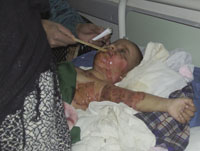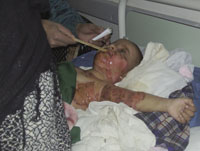
Gas cylinders:Everyday risk [Archives:2007/1014/Reportage]
January 8 2007
 |
For Yemen Times
Citizens complain about outdated gas cylinders that are unfit for domestic use. Those who sell them are greedy and unconcerned about the consequences associated with outdated gas cylinders lacking safety specifications. Such sellers don't consider that these cylinders claim the lives of numerous innocent people and destroy homes. Although the cylinders they sell leak gas, citizens are obliged to buy them despite the fact that they cause tragic devastation.
Thus, gas cylinders are a ticking time bomb. Citizens are shocked when they explode while at the same time, concerned government parties fail to address the problem.
Mohammed Saif Ahmad from Taiz governorate's Mawyah district recounted, “Gas leaked from the cylinder overnight and in the morning, so when my wife went into the kitchen to fix coffee, the cylinder exploded, destroying the ceiling of our home. Since the windows were shuttered, it turned into a massive house fire.”
He continued, “Every room in the house filled with gas. Two girls from our 15-member family died, while others were injured on various parts of their bodies. Not one of us escaped the incident. My hands and legs were burned, as well as my scalp”
Ahmad added that the incident occurred due to ignorance and carelessness on the part of concerned governmental parties.
“While all Yemenis were happy and celebrating the eid, my family and I were in the hospital during that time,” lamented the head of a Hajjah household, who requested not to be identified.
He narrated, “We got up on the morning of the eid to find our house in flames. When we bought the gas cylinder, we were doubtful about its valve, but we didn't mind using it because many cylinders are in the same condition. However, in the morning, the cylinder exploded while my wife was cooking.
“All of my family members were injured and one of my daughters died,” the man regretted, “We don't know whom we should sue or who's responsible for the incident.”
His pregnant wife delivered when she was taken to the hospital to be treated for burns. “There were nine of us when we were taken to the hospital, where one of my daughters died from her burns. But we returned home as nine after my wife delivered our baby!” he quipped.
Another gas cylinder victim Mohammed Ali Ma'odah explained, “I was disfigured, along with my wife and daughter, and we're still disfigured because we don't have enough money for treatment. Therefore, we're seeking philanthropists to help us pay such costs.”
Describing his ordeal, Ma'odah related, “My wife and I left the house to go shopping in the morning. Gas was leaking but we didn't know it. We couldn't smell the gas when we returned home, which is why we weren't cautious. After we returned, my wife started to turn on the stove, but the cylinder exploded, disfiguring our legs and faces. Our neighbors took us to the hospital, but we still suffer deformities because we couldn't afford the operations.”
Gas agent Mohammed Al-Hajzi remarked, “I don't think gas sellers have anything to do with the issue because the gas cylinders come to us filled from the company. We don't know what'll happen after the cylinder is opened; however, we do notice that some cylinders are outdated.
“The gas company should repair any damaged cylinders and confiscate outdated ones that can't be repaired,” he proposed.
Dr. Nasr Al-Qadasi, head of Al-Jumhury Hospital's Burn Department, pointed out that faulty gas cylinders are responsible for 90 percent of burn cases. “The Burn Department averages 3,000 burn cases annually and 23 people died from gas cylinder explosions in the second half of 2006,” he noted, “Carelessness and ignorance on the part of families, coupled with absence of monitoring outdated containers are behind these tragic incidents.”
Al-Qadasi suggested that gas companies should have a primary role in conducting periodic gas cylinder maintenance since citizens have no alarm systems in their homes. “Such companies ignore gas cylinders. Moreover, vendors who sell them on the streets via pushcarts don't handle them properly, as cylinder valves are exposed to damage, thus causing gas to leak,” he explained.
“Those parties concerned with the issue, such as the Yemeni Society for Consumer Protection and the General Authority for Specifications, Standards and Quality Control, don't play an effective role in tackling it, so they're responsible for incidents of this type,” Al-Qadasi concluded.
Sana'a resident, Abdulhamid Al-Sarori, another citizen affected by gas cylinder explosions, recalled that gas leaked in his house overnight, but he didn't know it. “We were misfortunate because the kitchen was closed tightly. When my wife turned on the stove to cook in the morning, the leaked gas exploded, damaging our doors and windows and burning my wife, who remained in the hospital for three weeks,” he described.
However, he admitted, “We behave carelessly by sending our children to bring full gas cylinders, which they roll down the street on the way home. Also, the majority of citizens and gas sellers don't check the cylinders before filling them or exchanging them for full ones.”
According to Al-Sarori, many people also complain about lack of the distinctive substance merceptan, which produces an odor, thus alerting residents about a gas leak.
Mahmoud Al-Sharjabi described gas cylinders in Yemeni markets as ticking time bombs in every home. “I've bought gas cylinders lacking safety specifications, but ordinary citizens can't do anything about it. Parties like the Yemeni Society for Consumer Protection and the General Authority for Specifications, Standards and Quality Control are responsible for the problem and its consequences,” he asserted.
Hisham Mohammed commented, “My wife made a mistake. She knew the gas was leaking, but she turned on the stove and was burned. Not maintaining outdated gas cylinders for domestic use shows that both citizens and concerned parties are careless because there's no monitoring.”
Sana'a University teacher Hussein Al-Junaid noted that many people have been killed or injured in gas cylinder explosions, suggesting, “Gas companies must check the cylinders before filling them to see whether they meet safety requirements.”
However, Ahmad Al-Basha, Deputy Director of the General Authority for Specifications, Standards and Quality Control, pointed out, “The authority has listed a number of safety specifications to save citizens' lives and protect them from gas cylinder explosions. However, the problem persists because both citizens and gas agents still use outdated cylinders, which helps to exacerbate the problem and is riskier to our lives.”
He added, “We've been requesting gas cylinder manufacturers to remove all outdated gas cylinders from the market and impose heavy sanctions on those selling them to citizens. Such companies have specialized engineers, who should check gas cylinders and decide whether they're fit for domestic use.”
Al-Basha stressed that mishandling gas cylinders and lack of awareness about how to deal with these cylinders makes them ticking time bombs. “[However,] we've now recruited field agents to monitor violations and report them to concerned parties, who then will take necessary measures in this regard,” he concluded.
——
[archive-e:1014-v:14-y:2007-d:2007-01-08-p:report]


